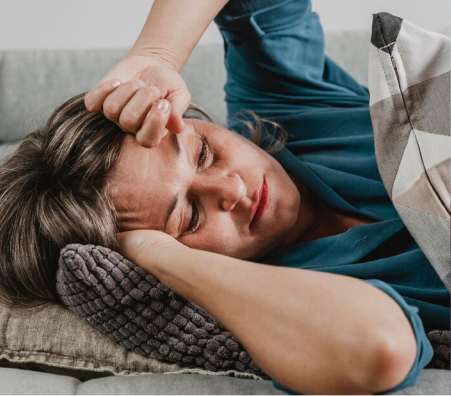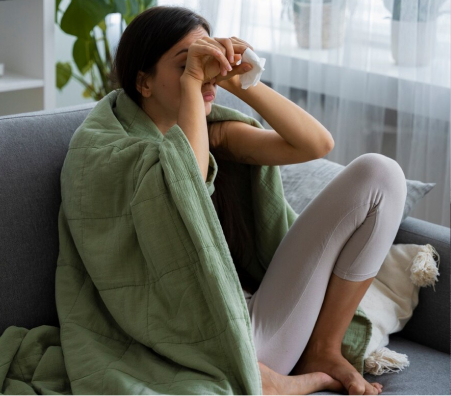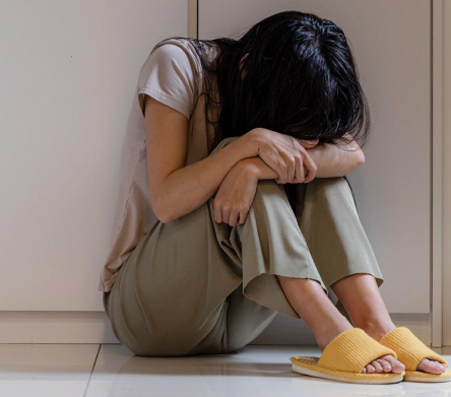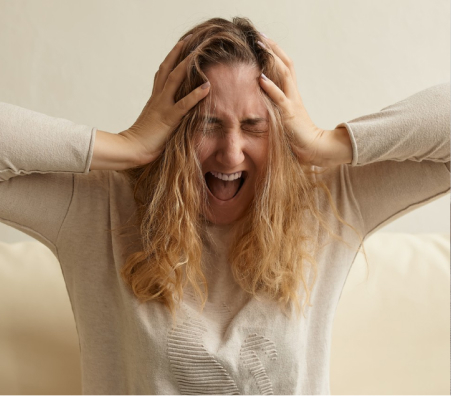At the mention of seasonal depression, most people think of overwhelming sadness and emptiness occurring in the winter. While this is the most common pattern of seasonal depression, summer seasonal depression can also take place, and it comes with additional symptoms that require addressing.
Seasonal depression in the summer demands a slightly different lifestyle strategy due to its different environmental influences and slightly different clinical image. However, professional help at its core is the same as with the other winter types of seasonal depression. Evidence-based psychotherapy and medications, when needed, are essential for recovery.
Skip To:
What Is Seasonal Depression?
Seasonal depression or seasonal affective disorder (SAD) is a mood disorder characterized by a seasonal pattern. Typically, it takes place during the winter, and the lack of sunlight is an often-mentioned factor in its development. Knowing this, one might wonder: Can you get seasonal depression in the summer?

Can You Get Seasonal Depression in the Summer?
Summer seasonal depression is a less known and less prevalent type of SAD, but it can still take place and affect one´s life in a disabling way. With this seasonal pattern, depressive symptoms start occurring in spring or early summer and end when summer ends. However, there are cases when this pattern combines with a manic episode in the winter and vice versa: to experience mania during summer and depression in winter. For the summer SAD to be diagnosed, the summer depression pattern has to happen for at least two years.
In addition to the symptoms of the winter pattern of SAD, there are several symptoms characteristic only of seasonal depression in summer. Those unique summer depression symptoms are:
- Difficulties sleeping (insomnia)
- Decreased appetite, leading to weight loss
- Restlessness and agitation
- Anxiety
- Violent or aggressive behavior
Some people are able to go through SAD with a few lifestyle changes, while others require professional treatment to be able to function.

Causes of Summer Seasonal Depression
While winter blues and winter seasonal depression are connected to the lack of sunlight, summer seasonal depression is related mostly to the increase of sunlight that, through a disturbance in melatonin production, affects circadian rhythm and, with that, causes depressive mood. The reduction in melatonin levels is consistent with long, hot summer days, and it worsens sleep quality. Days are becoming longer, and nights are becoming shorter, and this melatonin production change causes disruptions in normal daily rhythms.
Although the assumed impact of longer summer days, heat, and humidity is not systematically reviewed, they are still perceived as significant factors contributing to mood disorders, and they are being investigated. One study shows that seasonal mood changes associated with summer depression are related to high pollen days.
Additional disruption comes from different daily and seasonal routines. For instance, summer vacations or changes in work and school schedules can disrupt one´s routine and lead to mood changes. Another potential social factor is related to social pressure coming with the summer season: expectations to look a certain way during summer days.
Get Help. Get Better. Get Your Life Back.
Searching for Accredited Dual Diagnosis Mental Health Centers Near You?
Even if therapy failed previously, or are in the middle of a difficult crisis, we stand ready to support you. Our trusted behavioral health specialists will not give up on you. When you feel ready or just want someone to speak to about counseling alternatives to change your life call us. Even if we cannot assist you, we will lead you to wherever you can get support. There is no obligation. Call our hotline today.
FREE 24/7 Dual Diagnosis Mental Health Services HotlineRisk Factors for Summer Seasonal Depression
Other than being exposed to certain potential causes of SAD, there are assumptions about risk factors. It is probable that some people are genetically predisposed to not being able to adjust their circadian rhythm. There are studies implying that multiple genes play a part in seasonal depression development.
Summer seasonal depression might be inheritable, although a clear pattern was not identified. What was noticed is that many individuals with SAD have relatives with other mood or psychological disorders. This, again, might be related to the same genes being risk factors for different disorders. Additionally, those struggling with SAD tend to have other disorders as well, such as ADHD or eating disorders.
Some studies suggest that thyroid hormones could play a part in SAD development. There may be a fault in the brain’s thyroid metabolism, or there may also be an interaction between thyroid hormones and different neurotransmitter systems.

Treatment Options for Summer Seasonal Depression
To fight the seasonal depression in summer, you can introduce certain lifestyle changes. The idea is to help your body fight the causes of summer SAD or to decrease their impact. Depression treatment centers in Washington State recommend these adjustments during the summer season:
- Maintain a constant routine: Many struggle with summer seasonal depression due to their daily routine being broken as the body has problems adjusting to new schedules. Establish and maintain a routine that works for you to avoid constant bodily adjusting.
- Keep yourself cool. Heat and humidity are potential causes of summer seasonal depression, so staying cool helps the body. Use air conditioning, take cold showers, and avoid going out during the hottest hours.
- Limit exposure to direct sunlight. Seasonal disturbances are being connected with the amount of sunlight we are exposed to, so limiting your exposure by wearing sunglasses or having blinds at home can help.
- Take care of your body. Staying hydrated and maintaining a balanced diet should be part of your routine. A strong body aids adaptation when it is required.
If your symptoms are more severe and lifestyle changes have not been enough to alleviate them, you might need Washington behavioral health services. Professional medical and psychotherapeutic staff can tailor a recovery program to address your specific symptoms and underlying causes.
End the Emotional Pain. Get Your Life Back.
Feeling Depressed, Anxious or Struggling with Mental Health Illness? Get Safe Comfortable Mental Health Dual Diagnosis High-Quality Therapy From Counselors That Care. Begin Your Recovery Now.
Hotline: (509) 348-4077

You might be in need of medications to fight mood changes or sleep disturbances. Antidepressants are a group of FDA-approved medicines typically prescribed for depression disorders, but their use needs to be controlled and monitored. Only licensed staff can prescribe them for clients.
To identify and analyze potential underlying causes of summer depression, mental health treatment centers in Washington State can offer evidence-based therapy as a tool for understanding oneself and, with that, mental health problems such as seasonal depression. Cognitive-behavioral therapy (CBT) helps analyze your thoughts and identify those that might be leading to maladaptive behaviors. The objective is to replace those dysfunctional thought patterns with functional ones that are adaptive and, therefore, aid in fighting seasonal depression.

Calming Techniques for Managing Anxiety Related to SAD
Anxiety frequently accompanies summer SAD, but there are calming techniques for anxiety you can implement as a part of your routine that can be beneficial for more than just anxiety. Here are some examples:
- Deep breathing exercises help calm down the nervous system and lower the heart rate. There are several breathing techniques for anxiety, so you can choose which one suits you best. They can be easily practiced anywhere, so they can become your go-to tool whenever you start feeling anxious.
- Mindfulness and meditation practices are meant to keep you grounded by allowing thoughts and emotions to pass without being evaluated. The idea is to eliminate causes of anxiety, which are typically our evaluations of things going wrong.
- Physical activities like yoga or gentle stretching can be very beneficial for mental health. Even small physical activity can have an even greater effect if done outdoors. The calming effect comes from endorphins being released during physical activity.
These techniques have proven to be beneficial as a supplementary method for addressing different mental health conditions, anxiety being one of them. However, if the symptoms are overwhelming and you are struggling to rely on these techniques only, seek professional assistance.
Comfortable Facilities & Amenities
High-Quality Mental Health Services & Behaviroal Health Substance Abuse Treatment
Rehab Centers TourRenowned Mental Health Centers. Serene Private Facilities. Inpatient Rehab Programs Vary.
Mental Health Helpline: (509) 348-4077Proven recovery success experience, backed by a Team w/ History of:
15+
Years of Unified Experience
100s
5-Star Reviews Across Our Centers
10K
Recovery Success Stories Across Our Network
- Low Patient to Therapist Ratio
- Comprehensive Dual-Diagnosis Treatment
- Complimentary Family & Alumni Programs
- Coaching, Recovery & Development Events
- Comfortable Onsite Medical Detox Center
When to Seek Help for Summer Seasonal Depression
As previously mentioned, there are lifestyle changes and techniques that are fairly easy to implement into the daily routine to help yourself fight some symptoms of summer seasonal depression. However, symptoms can sometimes become overwhelming and start affecting your daily obligations, relationships, or physical health.
In those cases, seeking professional help can bring relief. Summer seasonal depression is a condition not to be taken lightly. It is very likely you will experience it more than once in your life, so understanding why it’s happening and how to manage it properly can mean a significant change in your quality of life.
Be sure to react to the first symptoms of prolonged and overwhelming sadness, as the sooner you start treatments, the sooner you will feel better and the easier it will be to establish new patterns of thinking and acting.

Fight the Seasonal Depression with We Level Up Washington
Although summer seasonal depression tends to fade with the summer ending, it should not be ignored once it starts impairing your life. You deserve to live your full potential all year; if you need help, do not be afraid to seek it. Learning some techniques or implementing some daily rituals can have a significant positive effect on your mental state.
We Level Up Washington has years of professional experience treating different types of depression disorders. We can help you get back on track by relying on a holistic, evidence-based approach and techniques that are proven to work. Call us and start enjoying summer!
World-class, Accredited, 5-Star Reviewed, Effective Mental Health Dual Diagnosis Programs. Complete Integrated Inpatient Rehab with Free Post Discharge Therapy Planning.
Hotline: (509) 348-4077End the Emotional Pain Rollercoaster. Gain Stability & Happiness Through Recovery Treatment. Start Mental Health Counseling Today. Get Free No-obligation Guidance by Behaviroal Health Specialists Who Understand Mental Health Recovery.
Experience Transformative Recovery at the We Level Up Treatment Center.
See our authentic success stories. Get inspired.
Get the help you deserve.



Start a New Life
Begin with a free call to a behavioral health treatment advisor. Learn more about our dual-diagnosis programs. The We Level Up treatment center network delivers recovery programs that vary by each treatment facility. Call to learn more.
- Personalized Care
- Caring Accountable Staff
- World-class Amenities
- Licensed & Accredited
- Renowned w/ 5-Star Reviews
We’ll Call You
Sources
“Seasonal Affective Disorder: MedlinePlus Genetics.” Medlineplus.gov, medlineplus.gov/genetics/condition/seasonal-affective-disorder/#inheritance.
Akram, Faisal, et al. “Mood Worsening on Days with High Pollen Counts Is Associated with a Summer Pattern of Seasonality.” Pteridines, vol. 30, no. 1, 1 Jan. 2019, pp. 133–141, https://doi.org/10.1515/pteridines-2019-0016. Accessed 8 June 2020.
Gupta, R. “Alternative Patterns of Seasonal Affective Disorder: Three Case Reports from North India.” the American Journal of Psychiatry, vol. 145, no. 4, 1 Apr. 1988, pp. 515–516, https://doi.org/10.1176/ajp.145.4.515. Accessed 11 June 2024.
National Institute of Mental Health. “Seasonal Affective Disorder.” Www.nimh.nih.gov, National Institute of Mental Health, 2020, www.nimh.nih.gov/health/publications/seasonal-affective-disorder.





